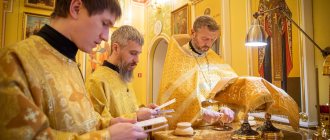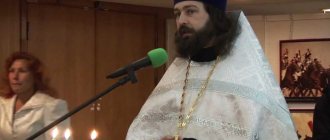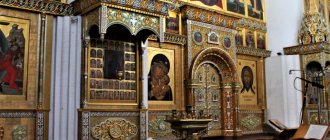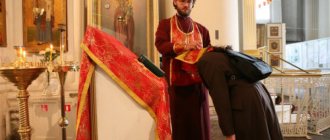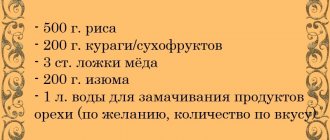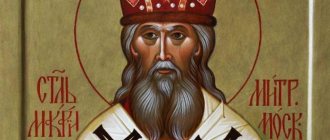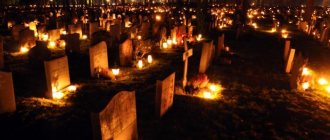The loss of a loved one is always considered a great grief for each of us. A memorial service for the repose can turn us away from this state a little. We constantly catch ourselves thinking that we miss him and we try to get everything back, but this is no longer possible. There is an opinion that we can help the soul find eternal peace. Reading prayers will help us with this. You can do this either independently or with a priest. It is recommended to do this on the most important dates of the person’s departure.
Remembrance of the Dead
It is natural for every person to love their loved ones. And even after they have already passed on to another world. For Christians, this love is manifested in prayer for the souls of the dead. According to Orthodox teaching, the final fate after death will be decided at the Last Judgment. It will be eternal joy and bliss in the Kingdom of God, or eternal torment in hell. Until this time, those living on earth with their prayers and alms can ease the lot of deceased people. And a memorial service is an effective way to do this for souls awaiting their fate.
Memorial service - prayer for the departed
“The duty of love to our neighbors obliges us to pray for the departed who have passed into eternity. Their fate is unknown to us, but we must certainly pray for them. Because it is very good for them and it is of great benefit to us. By praying for the deceased, we thereby testify to our love for them, express compassion and mercy. And the Lord said that blessed are the merciful, for they will receive mercy (Gospel of Matthew 5:7). Moreover, if our neighbor, for whom we pray, has pleased the Lord, then he himself already has boldness before the Lord and can offer his prayers before Him for us” (Archimandrite Kirill Pavlov, 1919-2017).
Rules of Service
If a person wants to order a service for the repose of the soul, then he should bring alms for the eve. According to beliefs, this symbolizes prosperity and satiety for the dead in the afterlife. But, of course, these are superstitions. The dead do not need such food. The best food for them is prayer from loved ones and alms.
You need to bring food that does not spoil for a long time:
- cereals;
- cookie;
- vegetable oil;
- bread.
Meat is never brought to such a table. Food is given for the temple and its servants. Often the food is given to those in need.
At the moment when the clergyman reads prayers, parishioners hold burning church candles in their hands. Fire represents faith in true life. After the prayer service, the candles are extinguished. This is done as a sign that all people are mortal, earthly existence will end for some earlier, for others later.
What does memorial service mean?
In early Christian times, when the Church was persecuted, the burial of dead Christians took place at night. The service performed at this time was literally an all-night vigil. That is, it lasted throughout the whole night. After the separation of the burial rite from the all-night service, both of them retained the same names. The word “requiem service” comes from the ancient Greek “παννυχίς” (“pannikhis”) - “all-night vigil”.
A memorial service is a shortened form of the burial rite (a special service performed once over the body of the deceased).
“We say goodbye to a person once, and the funeral service is performed only once. But the need for prayer for those who are dear to us remains throughout our lives. This is what a memorial service is for. This service has a comforting content for us who live here, and for the dead it has spiritual benefits” (priest Philip Ilyashenko).
Read also:
How to support a mourner after the death of a loved one? | Orthodox prayers for the dead |
| How to support a person who has suffered a loss ? Or maybe there are things that are not worth talking about? How to support someone who is grieving, what needs to be said, and what words are completely inappropriate? Read... | Presented here prayers, with whom you can turn to the saints for deceased, for the repose of his soul, for the forgiveness of his sins. Also these prayers you can remember deceased person. Select the desired... Read… |
Memorial service for the dead as a special funeral service
What is a memorial service? When is it served? Such questions naturally arise among people who have lost their loved ones. For prayerful remembrance of the deceased, the Orthodox Church has a special memorial service - a requiem. It is performed on significant days for the deceased Christian. According to the Apostolic Constitutions, such days are considered to be the 3rd, 9th, 40th, and anniversary of death.
“Perform the thirds of those who have fallen asleep in psalms, readings and prayers for the sake of the Risen One on the third day, and the tithes in remembrance of those who have fallen asleep here, and the fortieths according to the ancient model, for this is how the people of Israel mourned Moses, and the anniversary in memory of the deceased. And let them distribute from his property to the poor in remembrance of him” (Book of Apostolic Constitutions, 8:42).
Also special days of remembrance of the dead are Ecumenical Parental Saturdays, Radonitsa.
But a memorial service can be performed not only on the above days. In many churches it is served at the end of the Liturgy (for example, weekly on Sundays). The main content of the funeral service is the prayer of the Lord for the remission of sins of a deceased Christian. From the Orthodox point of view, before the Last Judgment, a change in the fate of the deceased is possible. The Holy Fathers testify that even the souls of sinners can be prayed for and delivered from a painful state. The deceased will no longer bring repentance to the Lord. They can receive remission of sins only through the prayers of the living for them. That is why funeral services are held.
Procedure for performing a memorial service
The procedure for performing a memorial service is described in the Trebnik (liturgical book).
The priest puts on an epitrachelion (a long ribbon that goes around the neck and both ends go down to the chest) and a phelonion (the upper liturgical vestment without sleeves). The funeral service takes place in the vestibule of the temple in front of a special table depicting the crucifixion of Jesus Christ. At the funeral service, the initial prayers, Psalm 90, funeral litanies (prayer requests), funeral troparia, psalms 118 and 50, and the funeral canon are read. The funeral service is accompanied by small censing (burning incense).
If there is a funeral kolivo, then it is consecrated.
For the deceased, you can serve the Great Requiem Service (in Greek - parastas). In this case, the full text of the funeral canon is read. The brief rite of requiem is called funeral litia. According to custom, it is read at home (when the body of the deceased has not yet been delivered to the temple). Litiya is performed after the body of the deceased is immersed in the grave. It is also served at home after returning from the cemetery. If necessary, the lithium is read after the end of the Liturgy in church.
Memorial service at the cemetery
During a burial, a memorial service for repose can be performed not only in a church, but also in a cemetery. Usually this is a private funeral service, performed on the memorial days of the deceased. These are the first forty days after death or on the day of funeral, birthday or death.
There is a Russian tradition to perform a general memorial service in the cemetery on Tuesday of the second week after Easter. This is the so-called Radonitsa. According to the Charter of the Russian Orthodox Church, no memorial services are held in the first week after Easter (Bright Week).
“This is a time of boundless spiritual joy about the Resurrection of Christ, therefore the funeral aspect is excluded from all types of services of this Week” (Archimandrite Dosifei Mikhailyuk).
According to St. Ambrose of Milan (4th century), after celebrating Easter, Christians should share the celebration and joy with the dead and proclaim to them the glory of the Risen Lord. From the “joyful” commemoration the name Radonitsa arose.
On this day, the funeral service is preceded by a religious procession, which, if possible, takes place around the cemetery fence. At the same time, the Easter Canon is sung, and the priest carries a censer, a cross and a three-candlestick in his hands. The memorial service is served according to the general rules in a place prepared for this purpose. To do this, the face is turned towards the east, and if the funeral service is performed at the grave, then towards the cross.
Symbol of faith
Services for the deceased are held in the church: memorial service, lithium, funeral service. In memory of the deceased, according to generally accepted custom, we light a candle on the “eve”. Kanun (canon) is usually located in the middle part of the Temple near the northern (left) side.
Kanun is a quadrangular table with a marble or metal board on which there are cells for candles and a small Cross. The eve with candles marks that faith in Jesus Christ can make all departed Orthodox Christians partakers of the Divine Light, the Light of Eternal Life in the Kingdom of Heaven. Therefore, when we light a candle for repose on the “eve”, we must offer up to the Lord for the departed whom we want to remember, a prayer: “Remember, Lord, the souls of your departed servants (their names), and all my relatives, and forgive them all their free sins and the involuntary, grant them the Kingdom and the participation of Your eternal blessings, and create for them an eternal memory” (three times). Usually candles are placed and lit not when one wants to, but during a service or prayer. There are days when they don’t light candles at all and don’t commemorate the dead. These are the days of Holy Week, when the hearts of believers are filled with sorrowful feelings of remembrance of the Passion of the Lord, and the days of Bright Week, when everyone triumphs and rejoices in the Risen Savior, therefore it is untimely to pray for the departed. The Orthodox Church has an ancient custom of offering prayers to God for the departed on the third, ninth and fortieth days after death. The deceased are commemorated on the day of their death every year. People often ask why these particular days are set. Saint Macarius of Alexandria addressed this question to the angels who accompanied him through the desert. The angel replied: “God did not allow anything unnecessary and useless to be done in His Church, but He arranged the sacraments and commanded them to be performed.”
On the third day, when prayer is offered up in the Church, the soul of the deceased receives from the Angel guarding it relief from the sorrow that comes from separation from the body, because the praise and offering for it are made in the Church, and good hope appears. For two days the soul, together with the Angels who are with it, is allowed to walk on the earth wherever it wants. The soul, loving the body, wanders around the house in which it was separated from the body, sometimes near the coffin. A virtuous soul walks to those places where it has done good, righteous deeds. On the third day, in imitation of the Risen Savior, the soul ascends to worship God, and we pray that Christ, resurrected on the third day, will resurrect the soul of the deceased for a blessed life. After worshiping God, He is commanded to show the soul the beauty of paradise, marveling and glorifying its Creator - God, it changes and forgets the sorrow that it had while in the body. But if the soul is guilty of sins, then at the sight of the pleasures of the saints it begins to grieve and reproach itself, regretting that it spent most of its life in carelessness and did not serve God as it should in order to be worthy of such grace.
On the ninth day, the soul is again ascended by the Angels to worship God. On the ninth day, we pray to the Lord that through the prayers and intercession of the nine ranks of Angels (Seraphim, Cherubim, Thrones, Dominions, Powers, Powers, Principalities, Archangels and Angels), He would forgive the sins of the deceased.
Memorial service
After the second worship, the Lord of All commands to take the soul to hell and show it the torment of the wicked. The soul remains in hell for thirty days, trembling so as not to be condemned to imprisonment there.
On the fortieth day, the soul again ascends to worship God, and then the Judge determines for her, based on her deeds, the place of imprisonment at His private Court. And the Church prays for the deceased, so that the Lord will help the newly deceased to withstand the test at the private Judgment of God, and so that on the fortieth day He, Ascended into heaven, will lift up the soul of the deceased to the heavenly abodes. Therefore, the state of the souls of people who died before the general Resurrection, before the second coming of the Lord, is not the same: the souls of the righteous are in union with Christ and in anticipation of the bliss that they will receive after the general Judgment, the souls of unrepentant sinners are in a painful state.
The souls of those who died in faith, but did not bear fruits worthy of repentance, can be helped by the prayers of relatives and friends, their alms and good deeds. Therefore, when you come to the Temple on the third, ninth, fortieth days, on the anniversary of death, on the birthday of the deceased, on the day of his Angel, you need to submit a note of repose. Before the fortieth day, the note must write “newly deceased (name).”
The everlasting psalter
The indefatigable Psalter is read not only about health, but also about peace. Since ancient times, ordering a commemoration on the Everlasting Psalter has been considered a great alms for a departed soul.
It is also good to order the Indestructible Psalter for yourself; you will feel the support. And one more important point, but far from the least important, there is eternal remembrance on the Undying Psalter. It seems expensive, but the result is more than millions of times more than the money spent. If this is still not possible, then you can order for a shorter period. It's also good to read for yourself.
Order from the monastery in Jerusalem
Sorokoust about repose
You can order a memorial service. A memorial service is a prayer for the dead. Funeral services are performed both in the house where the body of the deceased is located, and in the Temple, and at the grave. At a memorial service you can pray for one or more deceased Christians. To order a memorial service, you need to contact a “candle box” or a priest. You can serve a lithium for the deceased. Litia (Greek - “intense prayer”). This service is shorter than a funeral service. It is also performed by the priest at the request of relatives before removing the body from the house, when meeting the body in the vestibule of the Temple, upon the return of relatives to the house after burial, at the grave and in the Temple. In the Temple, lithium is celebrated during the days of Lent instead of a memorial service. Both during the lithium and at the memorial service on the days of remembrance of the dead, it is customary to bring and place on a special table next to the canon kolivo, otherwise called kutia. Kutia is boiled wheat mixed with honey. Kolivo serves as a reminder of the resurrection of the deceased. Just as a grain, which in order to bear fruit, must end up in the ground and decay, so the body of the deceased is consigned to the earth, so that, having decayed, in due time it will rise incorruptible for the future life. Honey signifies the spiritual sweetness of the blessings of Eternal Life. Nowadays, boiled rice is used instead of wheat. It is either mixed with raisins, or they decorate the top of the kutia, for example in the form of a Cross. Kutiya and other offerings after the funeral service are blessed by the priest and then, either at the grave or at home, before the funeral meal, are distributed little by little to those who come to remember the deceased. Usually the deceased are remembered with something sweet: kutia, jelly, honey, pancakes, etc.
The Orthodox Church performs special commemoration of deceased Orthodox (baptized) Christians several times throughout the year. Such commemorations are called Ecumenical requiems or Parental (Saturday before Maslenitsa, Saturdays of the second, third and fourth weeks of Great Lent, Saturday before the day of the Holy Trinity, Saturday before the day of remembrance of St. Demetrius of Thessaloniki (November 8, New Art.). Commemoration of soldiers is performed on the day Beheading of St. John the Baptist (September 11 AD)
And another commemoration of the dead takes place in the 2nd week after Easter - on Monday or Tuesday. It is performed with the pious intention of sharing the great joy of the Bright Resurrection of Christ with the dead, hence the name “Radonitsa”, when Orthodox Christians rush to greet the joyful “Christ is Risen!” deceased. It is on Radonitsa (and not on the day of Holy Easter) that the graves of close relatives are visited. It is necessary to put the graves in order in advance or later, but not on the day of Christ’s Resurrection (you shouldn’t clean up Radonitsa either). This is a sin, an insult and disrespect for the holiday of the holidays. We come to proclaim the joy that Christ has risen, to sing the troparion of the holiday, to sit and reflect on our lives, to mentally communicate with the deceased. There is no need to leave eggs, sweets on the grave, drink alcoholic beverages and leave them - this is not a Christian custom.
Prayer for repose
In the event of the death of an Orthodox Christian, certain rituals are performed.
When a Christian departs from this world, a special canon is read over him, which is called the “Canon of prayer for the separation of souls from the body,” or “departure.” After death, the body of the deceased is washed with water, then dressed in new clothes. Clothing must be consistent with the rank or service of the deceased or simply white. If a baby has died, then they put on baptismal clothes.
The everlasting psalter
The indefatigable Psalter is read not only about health, but also about peace. Since ancient times, ordering a commemoration on the Everlasting Psalter has been considered a great alms for a departed soul.
It is also good to order the Indestructible Psalter for yourself; you will feel the support. And one more important point, but far from the least important, there is eternal remembrance on the Undying Psalter. It seems expensive, but the result is more than millions of times more than the money spent. If this is still not possible, then you can order for a shorter period. It's also good to read for yourself.
Order from the monastery in Jerusalem
Candle of repose
The everlasting psalter
The indefatigable Psalter is read not only about health, but also about peace. Since ancient times, ordering a commemoration on the Everlasting Psalter has been considered a great alms for a departed soul.
It is also good to order the Indestructible Psalter for yourself; you will feel the support. And one more important point, but far from the least important, there is eternal remembrance on the Undying Psalter. It seems expensive, but the result is more than millions of times more than the money spent. If this is still not possible, then you can order for a shorter period. It's also good to read for yourself.
Order the Indestructible Psalter in the monastery in Jerusalem
Then the deceased is placed in a coffin, a aureole is placed on his forehead, that is, a paper ribbon with the image of Jesus Christ, the Mother of God and John the Baptist as a sign of the deceased’s victory over his passions and spiritual enemies. An icon of the Savior or the Mother of God is placed on the chest as a sign that the deceased believed in Christ and surrendered his soul to Him for judgment. A pectoral cross must be placed on the neck of the deceased, if there is none. The body of the deceased is covered with a church veil as a sign that the deceased is under the protection of the Church. If the coffin is at home, it is placed in the middle of the room in front of the home icons, turning the face of the deceased towards the exit. Candles are lit around the coffin on four sides as a sign that the deceased has moved into the realm of light - into a better afterlife. Then, at the grave, they begin to read the Psalter with the addition of prayers for the repose of the deceased. The Psalter is read from the moment of death until the funeral service. The order and rule for reading the Psalms is in the prayer book. Then the coffin with the body is transferred to the Temple for the funeral service; during the transfer, “Holy God” is sung. If desired and possible, you can stay in the Temple overnight. During the funeral service, you need to stand facing or sideways to the altar so that you can see the coffin, but not with your back, hold a candle in your left hand, and cross yourself with your right. During the funeral service, everyone stands with lit candles and prays not only for the deceased, but also for themselves. After the priest reads the prayer of permission, the candle in the hands of the deceased is extinguished and, with a prayer of permission, is placed in his right hand. Candles in the hands of family and friends are also extinguished as a sign that earthly life, burning like a candle, must also go out. Those praying ask the Lord for the repose of the newly deceased, for his settlement in paradise, where the righteous are, where there is neither illness nor sighing. Then relatives and friends come up to say goodbye to the deceased - this is the last kiss. Usually they kiss the icon on the chest of the deceased and on the forehead, where the aureole is. Then they return again to the place where they stood during the funeral service. Relatives must restrain their emotions when saying goodbye and funeral services. After farewell, the icon is taken from the chest of the deceased; you can take it home or leave it in the Temple for up to forty days, but then take it home and pray in front of it.
Sorokoust about repose
The deceased is completely covered with a veil and the priest sprinkles him with earth in a cross shape, saying: “The earth is the Lord’s and the fulfillment of it, the universe, and all who live on it.” Fresh flowers decorating the coffin are removed. If the sacrament of consecration of oil (unction) was performed during life, then the priest pours consecrated oil and wine onto the body of the deceased. Then the coffin is closed with a lid and “Eternal Memory” is sung. After the funeral service, the coffin is transferred to the cemetery and lowered into the grave (facing east). When the coffin has already been lowered into the grave, relatives throw handfuls of earth onto its lid. Money is not thrown into the grave - this is a pagan custom, not a Christian one. When the grave is buried, relatives can remember the deceased with kutia and sweets. The Holy Cross is placed on the grave of a Christian as a symbol of Christ’s victory over death and hell.
People who commit suicide are deprived of funeral services, church burial and prayer for them. But if there is evidence that suicide occurred due to loss of reason (mental disorder), then with this document you must go to the Patriarchate or the Diocesan Administration and obtain permission from the ruling bishop for the funeral service. In other cases, the Church does not offer prayers for unrepentant sinners and suicides, because, being in a state of despair, stubbornness and bitterness, in evil, they find themselves guilty of sins against the Holy Spirit, which, according to the teaching of Christ, will not be forgiven either in this age or in the future. future.
A special funeral service is performed for deceased baptized infants (up to seven years of age), as if they were blameless and sinless and whom the Church asks to be honored with the Kingdom of Heaven. Funeral services are not performed for unbaptized infants (for adults as well), since they have not been cleansed of their ancestral sin. But they will not be punished and will not be glorified.
The funeral service can be performed in absentia. To do this, you should come to the Temple and arrange an absentee funeral service. The relatives are given a prayer of permission with a whisk and soil in their hands. The aureole is placed on the forehead of the deceased, the prayer is placed in the right hand, a cross is placed on the neck, if there is none, an icon is placed on the chest. After farewell, the icon is taken away, the face is covered with a veil, and the veil is sprinkled with earth in a cross shape. You can keep this soil at home, there is no need to be afraid of it.
A prayer service and a memorial service are not the most important thing.
For a Christian, it is more important to submit notes of health or repose with prosphora to the Divine Liturgy and to prayerfully participate in the service, and not to leave it.
The most important church prayer for the living and the dead is performed at the proskomedia, which takes place before the liturgy during the reading of the hours. Notes with names are placed in the “candle box”, from there they are carried to the altar along with the prosphora. The priest reads the notes and takes out the “memorial” particles from the prosphora. At the end of the mass, the prosphora is returned to the “candle box”, from where they can be taken later. The prosphora is either eaten immediately or divided over several days and consumed at home with Holy water on an empty stomach and so that not a single crumb falls on the floor or is trampled under foot. Prosphora is a small round bread with an image of the Cross and the inscription “IC XC NI KA” (“Jesus Christ conquers”). Prosphora (Greek - offering) is made from wheat flour fermented with yeast. It consists of two circles, which are prepared separately and then connected, sticking one to the other. The two-part nature of the prosphora means that the Divinity and humanity in Jesus Christ are inseparable and unmerged, just like the circles in the prosphora. Pieces are taken out (cut out) from the prosphora, and the priest remembers (names) those for whom they are asked to pray in the notes. All particles taken from the prosphora are placed near the Lamb on the paten and at the end of the mass they are combined in the Chalice with the Holy Gifts - the Body and Blood of Christ. Through such a union, the living and the dead receive remission of sins and eternal life.
Sorokoust about repose
DIVINE LITURGY FROM JERUSALEM
Ordering requirements in the Holy Land
Commemoration at the Divine Liturgy Water Blessing Prayer Service Prayer for health Prayer for repose Prayer for health Candle for repose Candle for health Sorokoust for repose Sorokoust for health Requiem service
Like
SocButtons v1.5
How to order a memorial service
You can order a memorial service for the deceased in any Orthodox church and at any time. To do this, just contact the church shop. In order for the deceased to be remembered in prayer, a note is written with the name of the deceased. In many churches, memorial services are held not only on Sunday after the Liturgy, but also during the week. Such details must be clarified on site, in the temple chosen for the funeral service.
Particularly important is personal presence at the funeral service and direct participation in prayer.
“Some say: why remember the names of the deceased when praying for them? God, as omniscient, himself knows these names, and also knows the needs of everyone. But those who say this forget or do not know the importance of prayer, do not know how important the word spoken from the heart is - they forget that the justice of God and the mercy of God are bowed down by our heartfelt prayer, which the Lord, in His goodness, credits as if to the dead or living themselves as merit as members of the single body of the Church.
Such people do not know that the Church of the Firstborn, written in heaven, out of love constantly prays for us to God - and specifically mentions before God the names of those people who pray to them - equal for equal. We remembered them, they remembered us. And whoever does not remember his neighbors in prayer out of love will not be remembered and will not be worthy of commemoration. “One word of faith and love means a lot in prayer” (Righteous John of Kronstadt, 1829-1908).
Price
The Orthodox Church does not regulate specific prices. Parishioners give their funds in exchange for a service or product. All lay money is considered a donation. They are used for construction, repair of the temple or other needs. The average donation amount for a funeral prayer varies from 50 to 200 rubles, and for a sorokoust from 100 to 500 rubles.
Prayer is the true salvation of the soul. Their relatives pray for the dead, because they themselves cannot repent before God for what they have done in a worldly guise. Only relatives and friends help alleviate the suffering of those who have gone to another world.
Funeral service: video.
How do you remember the deceased - not only relatives, but also just acquaintances? Share in the comments. Bookmark the article and share it on social networks.
Prayer for the departed
Remember, O Lord our God, in faith and hope the life of your eternally departed (before the 40th day from the day of death - newly reposed) Thy servant (Thy deceased servant, Thy departed servant) (name), and as You are Good and Lover of Mankind, forgiving sins and consuming untruths , weaken, forsake, and forgive all his (her) voluntary and involuntary sins, raising him (up) at Your holy second coming to the communion of Your eternal blessings, for the sake of which there is only faith in You, the true God and Lover of mankind; for Thou art the resurrection and the life and the rest of Thy servant (name), Christ our God, and to Thee we ascribe glory, with Thy beginningless Father, and with the Most Holy Spirit, now and ever and unto ages of ages, Amen.
Read us conveniently on social networks:
Tags: memorial service for the dead, memorial service what is it, memorial service is this, what is a memorial service
